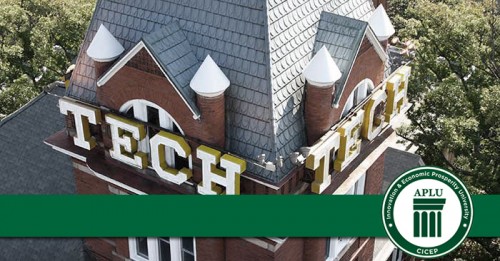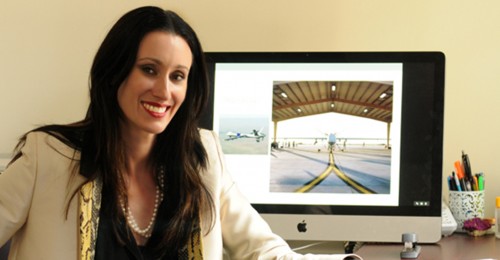Social Agents and Robots for Open-Ended Domains
Sponsor: National Science Foundation
PIs: Brian Magerko (Literature, Media, and Communication), Andrea Thomaz and Mark Riedl (Interactive Computing)
Additional Funding: $354,641
Total: $513,789
NET-Genesis: Network
Microdynamics in Emerging Technologies
Sponsor: University of Sussex
PI: Diana Hicks (Public Policy)
Funding: $22,762
Curriculum Development for Energy Technology and Policy Graduate Course
Sponsor: University of Tennessee
PI: Marilyn Brown (Public Policy)
Co-PI: Valerie Thomas (Public Policy, Industrial and Systems Engineering)
Funding: $8,415
Women Faculty in Computing
Sponsor: Alfred P. Sloan Foundation
PI: Mary Frank Fox (Public Policy)
Funding: $23,386
IPAWS – Inclusive Alerting
Sponsor: Department of Homeland Security/ Federal Emergency
Management Agency
PI: Helena Mitchell (Center for Advanced
Communications Policy)
Funding: $629,362
Retention of Early-Career Engineering Professional in the Georgia Department
of Transportation
Sponsor: Georgia Department of Transportation
PI: Juan Rogers (Public Policy)
Funding: $99,968
Making Scientists for a Democratic South Africa
Sponsor: National Science Foundation
PI: Anne Pollock (Literature, Media, and Communication)
Additional Funding: $60,588
Total: $170,618
Research on the Broader Impacts of Basic Science: Gauging the State of the Art
Sponsor: University of North Texas
PI: James Holbrook, Juan Rogers, Diana Hicks (Public Policy)
Funding: $77,791
Transplanting Modernity: How International Development Remade Environments
Sponsor: National Science Foundation
PI: Jenny Leigh Smith (History, Technology, and Society)
Funding: $22,892
U.S. Climate Mitigation Policies
Sponsor: Duke University
PI: Marilyn Brown (Public Policy)
Funding: $25,369
What Does Georgia Tech Think?
Selected Press for Ivan Allen College of Liberal Arts
|
Bogost on Agency in Video Games
“[Games like] Bioshock and The Stanley Parable…They're toying with the idea of the act of playing the game and becoming complicit in its directives. Both titles point to the issue of agency in games, [but] neither game really delivers. The answer might be to make games more literary. That means more ambiguous and writerly. More daring in their willingness not to fill in all of the blanks.” — Ian Bogost (LMC) on Yahoo News, August 18, 2014
Clark on the Essential Economy
“One of the things we were thinking about from a policy perspective is: how do I create more jobs? For the first time in about ten years, instead of talking about innovation policy all the time, we are talking about job creation again. One of the ways you do that is by [creating] non-exportable jobs that require labor. They cannot be substituted for technology.” — Jennifer Clark (Public Policy) on GPB Radio, August 8, 2014
Pearce on Robots in the Job Market
“...History does not bear out the myth that technology replaces people. First, people make technology, and since technology becomes obsolete at an increasingly accelerated pace, the need for people who make it will only grow; second, people are required to maintain technology; third, people are also required to assist other people in using technology; and fourth, most technology requires new labor forms.” — Celia Pearce (LMC) in Salon, August 6, 2014.
Telotte: Science Fiction Reflects our Anxieties
“This is what our genre films tend to do best—not detail the realities of specific problems so that we might avoid them, but rather represent our most pressing cultural anxieties.... While science fiction films and novels raise awareness of scientific and technological issues, they seldom function as primers for the solutions we need for these very knotty problems.” — Jay Telotte (LMC) in the New York Times, July 30, 2014. Cited in Blue & Green Tomorrow, August 3, 2014
Cáceres on Canada as an Export Market
“Asian markets combined buy the bulk of Georgian exports (35 percent), but Canada has managed to hold its own despite being ‘lesser known’.” — Diane Alleva Cáceres (Nunn School) in the Atlanta Business Chronicle, August 1, 2014.
Auslander on the Music of 1974
“The political and military events of 1974 took the wind out of the sails of counterculture, which had been setting musical trends since the mid-1960s. The musical paradigms [were] about to shift. The year's anomalies wouldn't be anomalous for long.” — Philip Auslander (LMC) on CNN, July 21, 2014
Walsh Study on Startups
“Start-ups may play a disproportionate role as sources of invention in U.S. manufacturing relative to older, larger firms, according to a recently released analysis of survey data from researchers at Duke University and Georgia Tech. About 14 percent of roughly 650 firms which introduced a new product between 2007 and 2009 said they sourced the underlying invention from a new, small firm.” — Study conducted by John Walsh (Public Policy) in Dow Jones Newswires, July 15, 2014
Colatrella on Gender Studies
“Infusing the concerns of gender studies in STEM fields can boost placement rates for women in high-salary science and technology jobs and lead to improved work-life balance across fields. Students value learning about how organizational environments incorporate or exclude individuals on the basis of gender, how stereotypes function in elite and popular cultural forms, and how and why the political clout of women and men varies.” — Carol Colatrella (LMC) in AAAS Science, July 10, 2014. Originally published in Academe.
Boston on Black Unemployment
“Unemployment among blacks has been particularly intractable. Yet last month it declined by almost a full percentage point, from 11.5 percent to 10.7 percent. Employment gains among blacks have always trailed gains of every other demographic group. So when their rate shows improvement, rates among other groups have already recovered.” — Danny Boston (Nunn School) in SaportaReport, July 4, 2014
Levine on Conflicts of Interest
“Both the California Institute for Regenerative Medicine (CIRM) and the Cancer Prevention and Research Institute of Texas (CPRIT) have faced the reality that you can get into situations that create concerns about interest groups. On the whole, though, CIRM has done a good job of awarding grants fairly.” — Aaron Levine (Public Policy) in Nature, July 2, 2014
September 17, 2014
3:15 pm
September 18, 2014
6:00 pm
September 19, 2014
12:00 pm
September 19, 2014
12:00 pm
September 22, 2014
4:00 pm
September 26, 2014
12:00 pm
September 26, 2014
12:00 pm
|

|
CACP Reports on Emergency Communication for Disabled Persons
Researchers at the Center for Advanced Communications Policy (CACP) have released a report to the President, funded by the National Council on Disabilities, on effective communication for people with disabilities before, during, and after emergencies.
Read more...
|
Graduate Programs Recalibrate to Stay Ahead
Academic life is ever-evolving, and graduate programs within the Ivan Allen College have been created, modified, and expanded to reflect shifting student interests, market opportunities, and innovations in research since the College’s founding in 1990.
Read more...
|

|
Georgia Tech Named an Innovation and Economic Prosperity University
In recognition of Georgia Tech’s commitment to economic development, the Association of Public and Land-grant Universities (APLU) has designated the Institute as an Innovation and Economic Prosperity University.
The designation acknowledges Tech’s work with public and private sector partners in the state and region to support economic development through innovation and entrepreneurship, technology transfer, workforce development, and community development.
Read More...
|

|
Jenna Jordan Examines the Effectiveness of Targeting Terror-Group Leadership
Jenna Jordan was a newly-enrolled graduate student at Stanford University when she discovered a direction for her research, on September 11, 2001. The 9-11 attacks and subsequent events surrounding them changed the framework for how we think about international politics and guided Jordan to her current research on the effectiveness of targeting the leaders of terrorist organizations.
Read more...
|

|
Modern Languages Travels to Senegal to Study Wolof, Senegalese Culture
This summer, representatives from the School of Modern Languages joined with 11 Atlanta Public Schools teachers to embark upon a four-week research project at the West African Research Center in Dakar, Senegal, funded by a Fulbright-Hays Group Project Abroad grant.
Read more...
|
Helena Mitchell Named Regents' Researcher
The University System of Georgia Board of Regents has appointed Helena Mitchell, executive director of the Center for Advanced Communications Policy and principal researcher in the School of Public Policy, to the position of Regents’ Researcher.
Read more...
|
AFA Names Dean Royster a 2014 Global Ambassador
Dean Jacqueline Royster, who spearheaded the Africa Atlanta 2014 initiative, has been selected by the Alliance Française d’Atlanta (AFA) as its 2014 Global Ambassador. The award recognizes local community leaders that have made a significant contribution to Atlanta through French language and culture or by being a global ambassador for the city.
Read more...
|
Colatrella Named Georgia Tech Diversity Champion
Carol Colatrella, associate dean for graduate studies and professor in the School of Literature, Media, and Communication, has been selected as a recipient of the 2014 Georgia Tech Diversity Champion Award.
Read more...
|
Campus to 'Breathe Easy' with Tobacco-Free Policy
Georgia Tech has become a tobacco-free campus, in accordance with the Tobacco- and Smoke-Free Campus Policy passed by the Board of Regents in March. This policy bans all forms of tobacco on all university and college campuses in the University System of Georgia (USG).
Read more...
|

|
New Students Learn the Traditions of Tech at T-Night
|
|